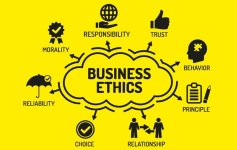SayviethaBT
Member
Business Ethics: The Heart of Responsible Enterprise
In today’s fast-paced and competitive business environment, business ethics has emerged as a crucial pillar of sustainable success. It goes beyond profit-making and speaks to how a company behaves in the marketplace, treats its employees, and interacts with its environment and society. Ethical practices in business not only shape the reputation of an organization but also play a key role in long-term profitability and public trust.
What is Business Ethics?
Business ethics refers to the moral principles and standards that guide behavior in the world of business. It involves applying general ethical ideas to business behavior, determining right from wrong, and making decisions that are not only legal but also morally sound.
These ethics cover a wide range of issues, such as:
- Fair treatment of employees
- Honesty in advertising
- Integrity in financial reporting
- Respect for the environment
- Transparency with customers and investors
At its core, business ethics is about doing the right thing, even when no one is watching.
Importance of Business Ethics
- Builds Reputation and Trust: Companies known for ethical behavior attract customers, investors, and employees. Trust takes years to build but can be destroyed in moments due to unethical actions.
- Enhances Employee Morale: Ethical companies treat their employees with respect, leading to higher job satisfaction, motivation, and productivity.
- Attracts Investment: Ethical businesses are often more attractive to investors, especially in an age when Environmental, Social, and Governance (ESG) criteria play a big role in investment decisions.
- Reduces Legal Risks: Ethical conduct ensures compliance with laws and regulations, reducing the risk of fines, lawsuits, and reputational damage.
- Customer Loyalty: Customers today are more socially conscious and prefer to support companies that reflect their values.
Key Principles of Business Ethics
- Integrity: Always acting honestly and with strong moral principles, whether in dealing with customers, suppliers, or employees.
- Fairness: Ensuring equal treatment and opportunities for all stakeholders. This includes fair pricing, promotions, hiring, and access to resources.
- Transparency: Being open and clear in all communications, particularly in areas like accounting, product information, and business strategies.
- Accountability: Taking responsibility for one’s actions, especially when things go wrong.
- Respect for Stakeholders: Considering the interests of all parties affected by business operations, including employees, customers, suppliers, and the community.
Common Ethical Issues in Business
- Discrimination and Harassment: Ethical businesses ensure a safe and inclusive workplace, free from bias, harassment, or any form of inequality.
- Bribery and Corruption: Offering or accepting bribes to influence business decisions is a major ethical breach and a criminal offense in most countries.
- Insider Trading: Using confidential company information for personal gain is unethical and illegal.
- Environmental Impact: Ethical businesses make efforts to minimize harm to the environment and actively seek sustainable practices.
- Misleading Advertising: Overpromising or providing false claims about a product’s effectiveness or safety is unethical and often illegal.
Business Ethics in the Global Context
In a globalized world, companies must navigate ethical challenges across cultures. What is considered ethical in one country may be viewed differently in another. For instance:
- Child labor is illegal and unethical in many nations, but still prevalent in some developing regions.
- Gifts in business settings may be seen as bribery in some cultures but as a sign of respect in others.
Multinational companies must develop universal ethical standards while being sensitive to cultural differences.
Examples of Ethical and Unethical Business Practices
- Ethical Example: The Body Shop, a cosmetics company, has long championed animal-free testing, environmental responsibility, and fair trade practices. It became a model for ethics in business.
- Unethical Example: The Enron scandal, where the company falsified accounting records to appear profitable, led to bankruptcy, loss of jobs, and jail time for executives. It remains one of the most infamous examples of business ethics failure.
The Role of Leadership in Business Ethics
Ethical behavior starts at the top. When company leaders act with integrity, it sets a standard for the entire organization. Ethical leadership means:
- Leading by example
- Encouraging open communication
- Rewarding ethical behavior
- Taking swift action against unethical conduct
An ethical culture is cultivated when leadership genuinely believes in and promotes ethical values.
How to Promote Business Ethics in the Workplace
- Code of Ethics: Create and communicate a formal document outlining ethical expectations and standards.
- Training and Awareness: Conduct regular training sessions on ethical behavior, dilemmas, and company policies.
- Ethics Committees: Form internal groups responsible for monitoring ethical practices and resolving issues.
- Whistleblower Policies: Encourage employees to report unethical behavior without fear of retaliation.
- Reward Ethical Behavior: Recognize and reward employees who demonstrate high ethical standards in their work.
Conclusion
Business ethics is not just a set of rules — it's a culture and commitment to doing the right thing. In an era where stakeholders demand transparency, sustainability, and accountability, ethical behavior is more important than ever. Companies that prioritize ethics not only avoid legal troubles but also build long-term trust and loyalty, leading to sustainable success.

